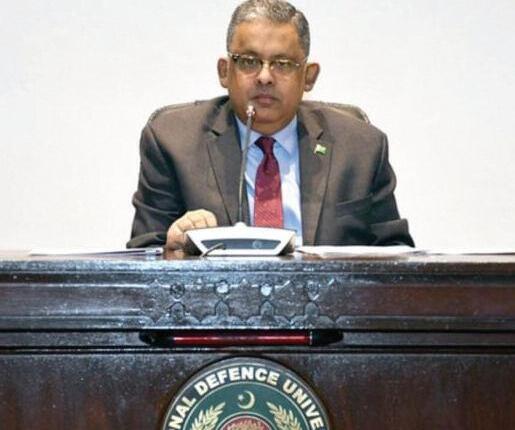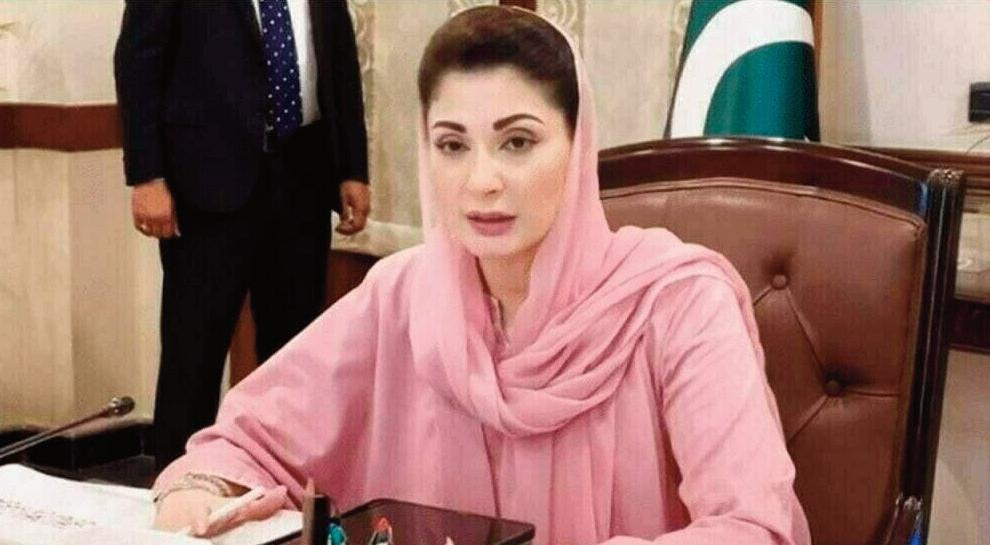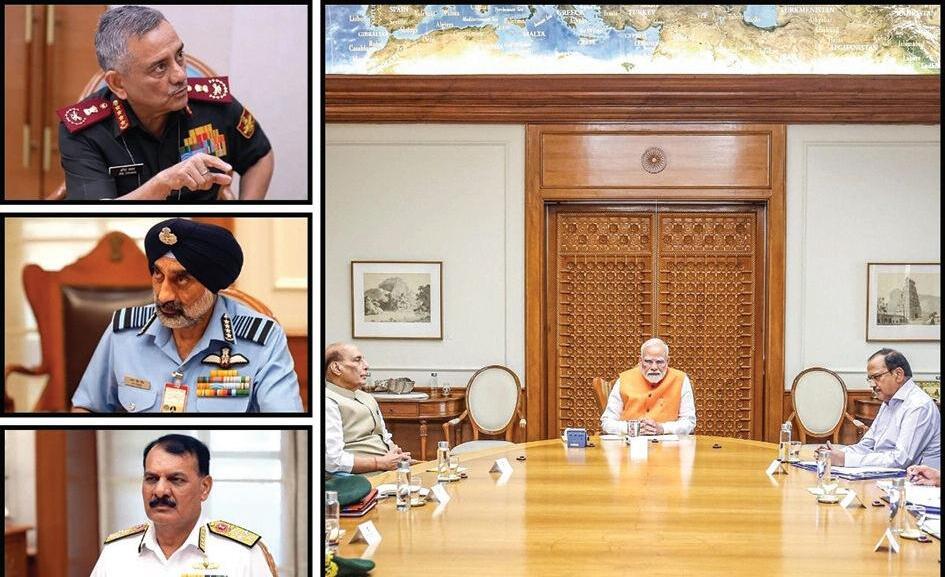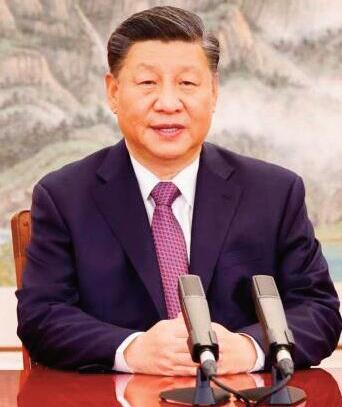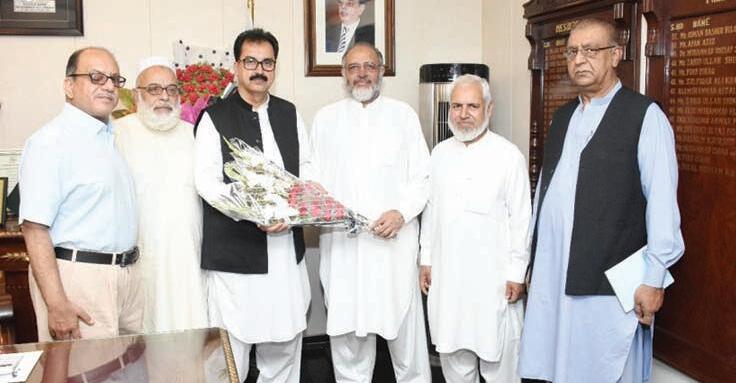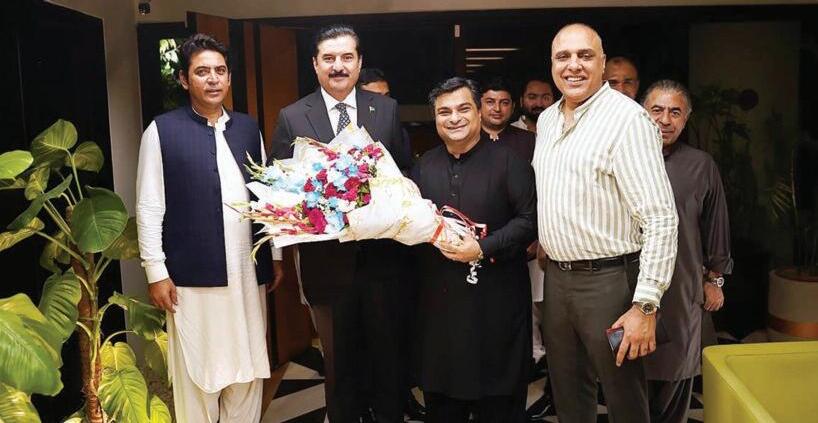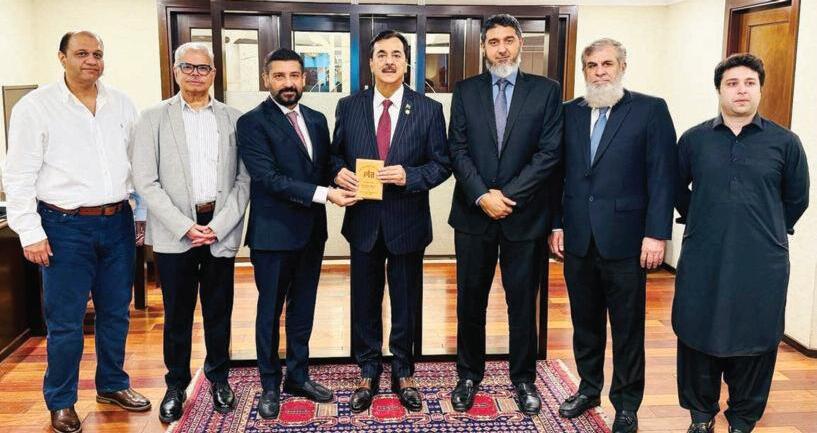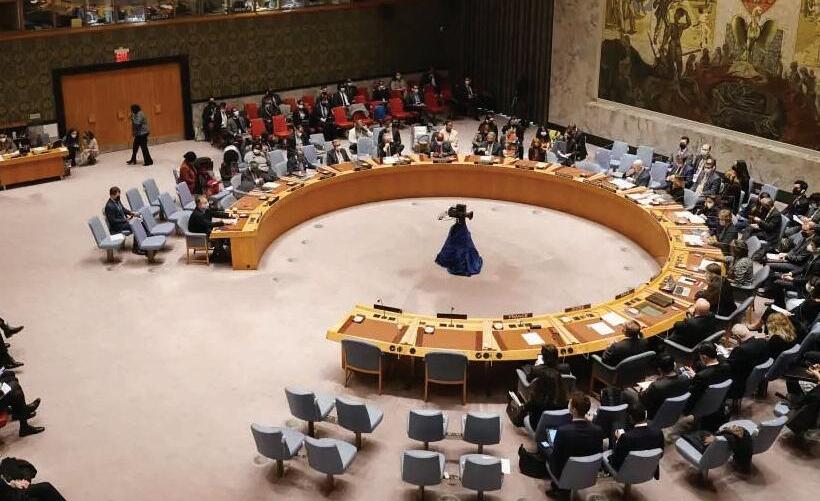g PM SHEHBAZ SAYS NEW DELHI YET TO RESPOND TO PAKISTAN ’S OFFER FOR A NEUTRAL PROBE INTO PAHALGAM INCIDENT
g S AY S T U
g EXPRESSES GRATITUDE TO PRESIDENT ERDOGAN FOR A STRONG STATEMENT IN PREVAILING SITUATION IN SOUTH A SIA
DG ISPR, Info Minister brief political par ties on national security today
paredness of
efforts and the
ficial stance of the state on key issues The briefing is set to cover the ongoing security concerns between Pakistan and India, will address the potential implications of the tense situation The initiative aims to foster national
and solidarity among political leadership during a time of heightened security concerns The briefing will serve as a platform to ensure that all political leaders are on the same page regarding the country’s defense and security preparedness Earlier Pakistan’s Ministry of Information and Broadcasting facilitated a visit for Pakistani and international media to the Line of Control (LoC) today and tomorrow The purpose of this visit is to expose India’s baseless and fabricated propaganda regarding so-called and imaginary “terrorist camps in Pakistan said a statement on Saturday
Dar raises alar m about ‘grave threat’
ISLAMABAD
in letter to UNSC chief
S TA F F R E P O R T
Deputy Prime Minister and Foreign Minister Ishaq Dar on Saturday sought urgent attention of the United Nations Security Council (UNSC) to growing escalation between Pakistan and India warning that it poses a grave threat to peace and security in South Asia
In a two-page letter addressed to UNSC President Jerome Bonnafont the DPM accused the New Delhi of undertaking “unilateral politically motivated and highly provocative actions over the past few days – actions that violate international law, established diplomatic norms and bilateral agreements
“These steps represent a calculated attempt to escalate regional tensions and to divert attention from India s internal challenges, including its record of state-sponsored terrorism and ongoing human rights violations in
ISLAMABAD S TA F F R E P O R T
Deputy PM and Foreign Minister Ishaq Dar reaffirmed Pakistan s commitment to regional peace and stability while resolutely protecting its sovereignty and national interests in a telephone conversations with Greek counterpart George Gerapetritis and Swiss Federal Councillor and Foreign Minister Ignazio Cassis The April 22 attack in Pahalgam, a tourist attraction in in Indian-Illegally Occupied Jammu (IIOJK) killed 26 people mostly tourists in one of the deadliest assaults since 2000 According to a Foreign Office (FO) press release on Saturday, in telephonic conversation with Greek counterpart FM Dar briefed him on current regional developments categorically rejecting India s baseless allegations disinformation campaign and illegal unilateral measures that threatened regional peace and security
the Indian Illegally Occupied Jammu and Kashmir (IIOJK),” the letter states Dar also categorically rejected India s accusations in the aftermath of the terror attack describ-
ing them as unsubstantiated and dangerous
“Pakistan firmly rejects the baseless allegations that India has sought to advance in the backdrop of the recent developments
Any
or
as saying “That is certainly not
in such a densely populated region ” “We want a peaceful neighbourhood ” Sheikh emphasised adding that Pakistan did not want any instability in the region However, he stressed, Pakistan s desire for peace should not in any way be misconstrued as a sign of weakness” “We want peace with dignity ” Sheikh described India’s response to the Pahalgam attack as dangerously premature and inflammatory according to the report
The envoy reiterated Prime Minister Shehbaz Sharif s offer to hold a neutral and transparent probe into the Pahalgam attack He pointed out that both the investigation offer and Pakistan’s request for evidence linking it to the attack had gone “unanswered”
Within minutes of the attack India began levelling accusations against Pakistan he said noting that a post-investigation report was filed just 10 minutes after the incident occurred, despite the remote and rugged terrain near the scene
RAWALPINDI
Amid the simmering on tensions borders with India, Pakistan on Saturday conducted a successful training launch of the Abdali Weapon System a surface-tosurface missile with a range of 450 kilometres the military s media wing said on Saturday
In a statement the Inter-Services Public Relations (ISPR) said The launch was aimed at ensuring the operational readiness of troops and validating key technical parameters, including the missile’s advanced navigation system and enhanced
PUNJAB CM SETS JUNE 30 DEADLINE FOR COMPLETION OF L AHORE DEVELOPMENT PROJECTS
farmers in limbo
the future of the program, and many remain unsure about when they can expect any tangible support Meanwhile vendors who underwent a lengthy and resource-intensive bidding process to qualify for the program are also expressing concerns Some are even considering legal action, as the delays threaten both their investments and the program’s credibility As the
Pakistan acted responsibly in face of India’s escalating moves: PM
CONTINUED FROM PAGE 01
PM Shehbaz expressed his gratitude to President Recep Tayyip Erdogan for his strong statement that supported Pakistan during the prevailing situation in South Asia as well as his call for peace in the region The prime minister noted that Turkiye s support to Pakistan was reflective of the historic deep-rooted and time-tested brotherly relations between the two countries and their peoples He reaffirmed the government’s focus on economic recovery and growth for which it required peace and security in its neighbourhood The Turkish ambassador informed the prime minister that Turkiye appreciated Pakistan s position and expressed its solidarity with Pakistan while calling for de-escalation and urging restraint in the current crisis to maintain peace and security in South Asia Earlier Prime Minister Shehbaz expressed gratitude to Chinese Premier Li Qiang for endorsing Islamabad s call for a credible and transparent international investigation into the April 22 attack in IIIOJK The prime minister made the remarks during a meeting with Chinese Ambassador Jiang Zaidong at the Prime Minister s Office in Islamabad where he also expressed gratitude to China for its consistent support amid escalating regional tensions

Zubair Mehmood Masood Khan Fazal Haq
Zulfiqar Ahmad Rahat Ali Ahmad Dhillon
Amir Mehmood Syed Intizar Hussain Zanjani
Aslam Mian Hamza Ali Afghan Ayaz Memon
Mudasir Alam, and Mehmood Alam Khalid
2025–26 Kazim Khan of Daily Dunya was elected as President and Ghulam Nabi Chandio of Daily Pak as Secretary General (SG) unopposed Similarly, Ayaz Khan was elected Senior Vice President, Tanveer Shaukat as Deputy Secretary General, Hamid Hussain Abidi as Finance Secretary and Zia Tanoli as Information Secretary The elected Vice Presidents include Qazi Asad Abid Adnan Zafar Yahya Khan Sadozai Mian Hassan Ahmad and Munir Ahmad Baloch The Joint Secretaries elected are Tahir Farooq, Munazza Seham, Rafi Niazi, Arif Baloch, and Waqas Tariq Farooq Other unopposed elected members of the Standing Committee include Dr Jabbar Khattak Ikram Sehgal Akmal Chauhan Babar Nizami Maqsood Yousufi Sher Muhammad Khawer Sardar Muhammad Siraj Mudasir Iqbal
Muhammad Owais Razi, Shehzad Amin, Irfan Athar, Shakeel Ahmad Turabi, Tazeen Akhtar, Anwar Sajdi, Mumtaz Ahmad Sadiq, Faqeer Manthar Mangrio Abdul Rahman Mangrio Dr
Newly-elected President Kazim Khan, during a Standing Committee meeting, expressed a firm commitment to defending Pakistan’s journalistic boundaries through truth and verified news He further stated that CPNE will continue to resist the misuse of the PECA Act, emphasizing that rulers must understand the difference between criticism and disrespect and ensure fair distribution of advertisements On the occasion, the house condemned India’s unilateral decision to suspend the Indus Waters Treaty based on a fabricated incident in Pahalgam This was declared a blatant violation of international law A resolution also condemned India s war hysteria that threatens the lives and security of over two billion people in the region and considered the escalating Pakistan-India tensions a global threat It was also highlighted in the meeting that the government acknowledged the responsible role of Pakistan s print electronic and digital media, which effectively presented the national narrative and countered Indian propaganda
OPEC+ poised to approve another oil output hike for June amid weak price environment
Jealous mistress


Th er e’s a phrase I remember hearing in my first week of law school: “The law is a jealous mistress ” I didn t quite grasp its meaning at the time Like many new students I assumed the biggest hurdles would be mastering doctrine and passing exams I saw graduation as the summit In reality, that was just base camp Fifteen years into practice, I now understand the truth that was quietly embedded in that warning: to serve the law is to serve a living breathing entity one that never stays still Lifelong learning isn t a luxury in this profession It s not a side project or an extracurricular It is the job I still remember the first time I was humbled by the limits of my legal knowledge I had just started as a junior associate at a mid-sized firm, working primarily on commercial disputes One of our long-standing clients asked if we could advise them on a new crossborder digital licensing agreement involving cloud software I nodded confidently After all I had aced contracts law in school But within minutes of reviewing the documentation, I was swamped into unfamiliar territory: evolving data privacy regulations, jurisdictional questions about servers and cross-border enforcement issues I hadn’t even considered I spent the next 48 hours buried in white papers legal journals and webinars catching up on a world I d never been taught It was humbling but also thrilling That project didn t just change how I approached a client’s work; it changed how I viewed my responsibility to the law itself Law school had given me a solid foundation but the real work of becoming a competent and eventually trusted adviser would take place outside the classroom year after year The legal landscape is always in motion New legislation, landmark rulings, global trends, and social movements shape the context in which we practice Whether it’s the GDPr transforming data law, generative AI challenging notions of authorship or climate litigation redefining accountability lawyers are increasingly called upon to not only interpret the law but also help shape it I ve come to believe that one of the greatest disservices we can do to ourselves as professionals is to assume that knowledge has a shelf life The truth is: it expires quickly some of my peers have pivoted entirely from criminal lawyers learning cybersecurity corporate lawyers becoming esG experts or litigator colleagues upskilling in mediation as the courts be-
B e y o n d t h e h e a d l i n e s
Exposing the Machiner y of Indian Propaganda
came more crowded post-pandemic The ones who flourish are not necessarily the ones with the most prestigious résumés but those who stay curious hungry and open to reinvention Clients don t come to us with textbook problems they come with real-world challenges shaped by modern realities If we re using decade-old knowledge or relying solely on intuition, we re not giving them what they deserve That doesn’t mean reinventing the wheel for every brief But it does mean staying engaged with the legal landscape and being willing to adapt I ve found that clients often trust lawyers who are honest about what they re still learning as long as they re clearly learning There s something powerful about saying, “That’s a developing area Let me dig into it and get back to you ” It builds credibility, not weakness so to the law students junior lawyers and even mid-career professionals who might feel stuck or stagnant: lean in Let go of the pressure to have it all figured out Instead, build habits of inquiry sign up for that webinar read outside your practice area Challenge your assumptions Volunteer for the assignment that stretches you The law will never stop changing But that’s not something to fear it’s something to embrace It means we get to grow alongside it That we re never truly done And that s what makes the work worth doing If you commit to learning, the law will reward

p e t i t i v e , a n d p ro t e c t e d . C l i e n t s d o n Ê t j u s t w a n t l e g a l a n sw e rs ; t h ey w a n t a dv


Tcapture global attention over the Kashmir issue, depicting India as a victim of cross-border terrorism and Muslims as perpetrators Without providing concrete evidence Indian media just a few minutes after directly pointed fingers at Pakistan for conducting a terror attack in the so-called mini-switzerland of Indian-Occupied Kashmir even in the presence of 800,000 Indian soldiers, surveillance infrastructure including drones, biometric checkpoints and electronic monitoring the state of India has failed to provide a single biometric evidence or CCTV footage that may allegedly link to Pakistan The lack of independent and nonconcrete evidence that would link the alleged attackers to Pakistan-sponsored groups further exposes India-sponsored propaganda against Pakistan The portrayal of Pakistan as the inherent aggressor and perpetrator of terrorism serves both global and domestic purposes
Globally India covers the sins with accusations by externalizing internal issues with a perpetual blame game By framing terror attacks as foreign-sponsored terror, silences the questions about local grievances, genocide in Indian-Occupied Kashmir and illegal occupation of Jammu and Kashmir by the Indian Army This is not an isolated incident a multidimensional strategy followed by a cycle of false flag operations including the Mumbai Attacks in 2008, the Pulwama Attacks, and the Balakot airstrikes In the 2000s Chattisinghpora massacre, initially blamed on Pakistani militants later yielded concrete evidence suggesting the involvement of Indian security forces confirmed through a CBI investigation and reported by The
Hindu (2003) however domestically it has been the time-tested formula for India to polarize Indian people in the name of Pakistan and Muslims that successfully serve their political campaigns for maximum vote bank India’s most popular political party BJP (Bharatiya Janata Party) functions on the notion of Akhand Bharat (Greater India) viewing Muslims as foreign invaders leads to tense relationships between Muslims and hindus of India and state-sponsored violence on Indian Muslims as well Attacks like Pahalgam are often leveraged to frame an antagonist narrative about Pakistan and gain domestic hindu nationalist sentiments
But these baseless allegations along with media amplification despite operating neutrally function as psychological monitoring to accept punitive measures including military, economic, and diplomatic against Pakistan Nevertheless the fabricated sensationalized and engineered narrative by Indian state-owned media channels has faced mounting criticism from within India itself exposing the cracks in the country s propaganda machinery several videos have been circulating where Indian citizens have exposed Indian propaganda machinery that moulds these attacks into cross-border terrorism rather than prompting a re-evaluation of domestic security and intelligence failures
In contrast to India s theatrics Pakistan s response has been characterized by restraint and strategic clarity, Prime Minister shehbaz sharif and opposition leaders have categorically condemned the tragic incident while rejecting baseless allegations Addressing a passing-out parade at Pakistan Military Academy Kakul the PM said Pakistan is open to participating in any neutral transparent and credible investigation
The premier criticized India for continuing with a “pattern of exploitation”, leveling baseless allegations and false accusations without credible investigation or verifiable evidence
Whereas former Foreign Minister of Pakistan
Bilawal Bhutto-Zardari called for a UN-medi-
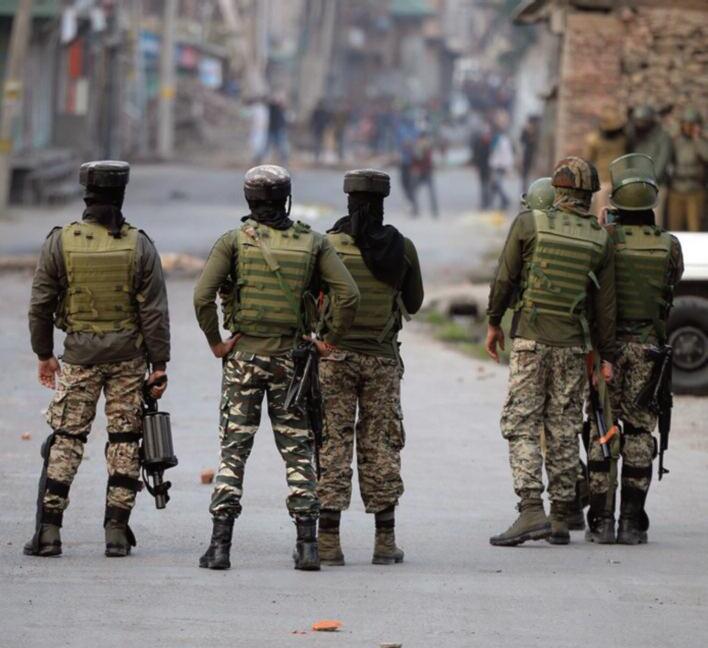
ated investigation and multilateral dialogue between India and Pakistan further illustrates Pakistan s commitment to more legal diplomatic and justified avenues, a stark counterpoint to India s belligerent moves Notably, UN secretary-General Antonio Guterres has urged both Pakistan and India to exercise maximum restraint and to ensure that the situation and developments do not deteriorate further Far from promoting peace India is fanning the flames through sensationalized and distorted narratives and acts of war While Pakistan seeks more legal and diplomatic measures to respond to India’s disturbing moves that may end in regional instability Continuous building of false narratives and accusations of cross-border terrorism without evidence would further exacerbate the conflict Pakistan always errs by placing itself in a defensive position, and instead of merely rebutting, it should strongly highlight grave human rights violations and crackdowns in Indian-occupied Kashmir where civilians remain at perpetual risk To counter these false narratives imposed by India the Pakistani media landscape must evolve from defensive rebuttals to proactive truth-telling rather than countering Indian false accusations Pakistani journalists must collaborate with global and international investigators and journalists to highlight human rights violations in Indian-Occupied Kashmir
The writer is a freelance columnist
Pakistan always errs by placing itself in a defensive position, and instead of merely rebutting, it should strongly highlight grave human rights violations and crackdowns in Indianoccupied Kashmir, where civilians remain at perpetual risk. To counter these false narratives imposed by India, the Pakistani media landscape must evolve from defensive rebuttals to proactive truth-telling rather than countering Indian false accusations.
Women in bureaucracy
Wake up call
Green and clean
Sajjad ali
Sarmad Sattar
INDIA roared, and the world shrugged the Modi government’s reaction to the Pahalgam attack was so predictable that it was almost comical: within hours without any inquiry or supporting documentation New Delhi pointed the quivering finger directly at Pakistan For anyone even vaguely familiar
was different this time the world did not follow India’s manufactured rhythm this time No loud denunciations No fireworks from the diplomatic side there isn’t a global chorus supporting India s unfounded accusations of terrorism Just quiet Silence cold and calculated And the loudest diplomatic rebuke India has heard in years has resulted from that silence India thought the world would follow suit they thought Washington London and Brussels would repeat New Delhi s hysterical headlines and swallow its half-baked narratives whole once more After all hasn t this always worked in the
rocked by the international response or lack thereof the world has been watching, but the Modi regime was too drunk on its own propaganda to notice Observing India’s transformation from the largest democracy in the world to a paranoid ultra-nationalist nation fixated on projecting its own shortcomings Observing how its government transformed journalism into treason, dissent into sedition, and diplomacy into a public relations campaign Pakistan opted for diplomacy over drama while India frothed at the mouth Islamabad exemplified statesmanship in its response to the Pahalgam incident there was only a firm, dignified demand for evidence, impartiality, and truth no irate rhetoric or retaliatory bluster With the kind of poise that highlighted how frequently Pakistan has been the target
of Indian scapegoating Pakistan s Foreign Office declared False flags and premature accusations serve no one Pakistan, the region s largest victim of terrorism, demands evidence, not propaganda ” Pakistan changed the course of events with that one statement In a volatile neighbourhood it positioned itself as the mature actor rather than the accused the world was urged to wait for facts by Pakistan not India
For once, the world paid attention the biggest irony in India s diplomatic meltdown may be that, despite advocating for victims on the international scene it is also charged with planning real state-sponsored killings abroad Let s go back Canadian Prime Minister Justin trudeau delivered a political bombshell in June 2023 when he claimed that India was responsible for the British Columbia assassination of Sikh leader Hardeep Singh Nijjar this was more than just an accusation; it was supported by surveillance intelligence and the full force of Canada s legal system As expected, India denied it However, the world took notice the USA followed the FBI revealed an Indian plot to kill another Sikh activist in New York in November 2023 they made arrests the names were made public Indian intelligence networks were directly linked India suddenly appeared to be the wolf itself, rather than just a nation that was crying wolf Indian death squads operating inside Pakistan’s borders have also been a silent horror Surgical strikes of shadow warfare targeted killings committed with impunity have silenced critics dissidents and voices of resistance this is a pattern not conjecture Let us now pose the question that the world is finally starting to consider: How can a country that conducts international assassination campaigns maintain its moral superiority in the fight against terrorism?
US Secretary of State Marco Rubio called both Islamabad and New Delhi during this geopolitical conflagration Even though the events of these meetings didn t make for dramatic headlines, they had profound im-
plications
Rubio established a respectful and cooperative relationship with Prime Minister Shahbaz Sharif He declared, We acknowledge the sacrifices made by Pakistan and the necessity of dialogue over division ” His remarks which were a clear indication of Washington s shifting focus highlighted regional stability and praised Pakistan s counterterrorism efforts
Compare that to the formal, uncomfortable appearance of Rubio’s meeting with S Jaishankar, the Indian External Affairs Minister No reference to Pakistan’s responsibility No flaming proclamations merely ambiguous requests for continued engagement It was an opportunity to take pictures Not a collaboration Sadly, India s attempt to persuade the
I n d i a ’ s c o m p l e x h i s t o r y c a n n o t b e w i s h e d a w a y t h r o u g h t e x t b
Key historical chapters on the Delhi Sultanate and the Mughal empire were eliminated
WHistorian S Ir fan Habib has described the revisions as “Hindu nationalist propaganda”, while Harbans Mukhia sees them as attempts to unify the Hindu vote through cultural consolidation
H E N the National Council of Educational Research and training rolled out major revisions to the Class 7 Social Science textbooks last month it sparked a debate about historical accuracy and ideological intent Key historical chapters on the Delhi Sultanate and the Mughal empire were eliminated from the textbooks that are used by schools affiliated to the Central Board of Secondary Education At the same time new material was included highlighting ancient Indian dynasties and Hindu pilgrimage sites including the recently concluded Maha Kumbh the revised content emphasises some aspects of India s ancient heritage – focusing on dynasties such as the Mauryas, Shungas, and Sātavāhanas – while virtually erasing centuries of Muslim rule
FALSE BINARY: At the heart of the controversy lies a fundamental question: should education prioritise verifiable history or cultural memory? While epics such as the Ramayana and Mahabharata play a crucial role in shaping India s civilisational identity historians warn against equating mythology with history the former embodies symbolic truths and values, while the latter relies on documented evidence and critical inquiry the new chapters devote considerable space to sacred geography such as the 12 jyotirlingas or representations of Shiva and the four Himalayan pilgrimage sites of the Char Dham But they do not adequately distinguish between devotional tradition and historical fact Critics argue that such an approach undermines the core objective of history education: to foster critical thinking and an evidence-based understanding of the past
IDEOLOGICAL SHIFTS: these changes are part of a larger pattern of curriculum revisions influenced by the dominant political ideology Under various governments education has frequently become a battlefield for contesting narratives NCERt revisions in 2023 had already removed chapters on the Mughals in Class 12 along with material about Dalit writer Omprakash Valmiki and the theory of evolution in Class 10 these deletions were heavily criticised by historians as attempts at erasure, particularly of the contributions of Muslims and minority groups to Indian history
DISSENT AND SUPPORT: Reactions to the recent changes are deeply polarised Scholars such as Audrey truschke assert that erasing the Mughals from textbooks does not erase them from history, but it does deny students a fuller understanding of India s pluralistic past Others, such as academician Apoorvanand, warn that the revisions portray Indian history as exclusively Hindu, sidelining centuries of Islamic and syncretic influences in the subcontinent Meanwhile supporters of the move – particularly from the ruling Bharatiya Janata Party – defend the changes as a necessary corrective to what they see as a colonial and Marxist legacy in Indian historiography By spotlighting ancient Indian knowledge systems and spiritual traditions, they argue, the new curriculum fosters
to sanitise history and suppress uncomfortable truths
SELECTIVE MEMORY: One of the most glaring examples of selective representation is the inclusion of the recent Maha Kumbh Mela in the new curriculum the event is described in glowing terms, with references to the participation of over 660 million pilgrims emphasising its cultural magnitude Yet conspicuously absent is any mention of the stampede in Prayagraj which resulted in several deaths and injuries this selective omission has raised red flags among educators and historians who see it as a deliberate move to present an idealised and conflict-free narrative
REWRITING OR RECLAIMING? the deeper issue here is the evolving definition of history itself Is history simply a chronicle of rulers and battles or does it also encompass the social cultural and political experiences of all communities? By removing entire chapters on the Mughals and the Delhi Sultanate the new textbooks not only marginalise a significant part of India s past but also risk presenting a monolithic version of history that aligns with a specific ideological worldview
At the same time, incorporating India’s spiritual and cultural traditions into education is not inherently problematic – provided there is clarity about what constitutes history and what belongs to the realm of belief the problem arises when myth is repackaged as fact and when cultural pride is used to justify historical distortion
IDENTITY POLITICS: the textbook revisions reflect a broader ideological battle playing out in Indian society: the struggle between inclusive secular education and ethnocentric nationalism this is not merely an academic concern but one with serious implications for how future generations perceive themselves their country and their place in the world
Critics have gone so far as to call this process a form of cultural genocide , suggesting that erasing Muslim contributions from textbooks is part of a larger project to redefine Indian identity along religious lines Historian S Irfan Habib has described the revisions as “Hindu nationalist propaganda” while Harbans Mukhia sees them as attempts to unify the Hindu vote through cultural consolidation
BALANCED CURRICULUM: the need of the hour is not to eliminate religious or cultural references from textbooks but to present them in a nuanced and balanced manner the Mughal Empire, for instance, should be taught not just as a political period but also in terms of its artistic architectural and cultural contributions Similarly events like the Maha Kumbh can be included with full transparency acknowledging both their spiritual significance and logistical challenges A robust history curriculum should encourage students to think critically, engage with multiple perspectives and understand the past in all its complexity By doing so, education can become a bridge between tradition and reason, rather than a tool for ideological conformity the textbook changes are not just about what students learn – they are about how India defines itself as a nation Education must empower students with the ability to question investigate and understand the past – not as a monologue, but as a conversation among diverse voices Hasnain Naqvi is a former member of the history faculty at St Xavier ’ s College Mumbai
USA to support it was unsuccessful the collapse of what many refer to as the Modi Doctrine, a self-proclaimed vision of Indian global dominance based on performance, projection, and propaganda, lies at the core of this diplomatic disaster Dominance without legitimacy however is an illusion the illusion is now dissolving the Modi administration has used accusations of terrorism as a domestic tool there is a sudden terror incident, a spike in antiPakistan rhetoric, and the domestic demonization of minorities during every election season the world has finally grown weary of the act and the script is so overdone that it is now laughable Even worse India s own actions are damaging its reputation the democratic mask has fallen, from burning churches in Manipur to demolishing Muslim homes in Delhi from stifling Kashmiri voices to imposing gag orders on journalists What’s left is a Hindutva-inspired government that is nauseous and intolerant of criticism Pakistan has been demonized on the global scene for years, frequently unjustly and frequently as an easy scapegoat for India’s shortcomings However, Islamabad has been subtly restoring its reputation around the world in recent years by being open patient and diplomatic
Pakistan is reclaiming its position as a responsible international actor by hosting high-level discussions with China, the USA, and Gulf states, as well as by actively participating in forums related to economics, climate change and counterterrorism And that consistent diplomatic work is now bearing fruit in the wake of the Pahalgam incident
Agovernments delivered a
new initiative titled Mission 300 It aims to reduce Africa’s energy poverty by halving the number of Africans without access to electricity from 600 million to 300 million by 2030 the chances of realising this goal especially within this short period depends on the extent to which the continent takes charge and overcomes external competing interests Over time, Africa’s pursuit of climate justice including a just energy transition has been hampered by self-interest and the strong positions held by rich countries and billionaires positions that have prevailed over reason and the common good For example, last year s 29th Conference of Parties (COP29) finally agreed on a paltry $300 billion of climate finance annually by 2035 against the $1 3 trillion per year by 2030 that Majority World countries had pushed for this was after two weeks of intense negotiations Africa has been denied not only access to climate funds but also the technology needed for a green transition, as rich countries delay their own transition, resulting in a lack of structured mechanisms for technological transfer to Majority World countries Plans by big oil companies from rich countries such as ExxonMobil BP and total Energies, to achieve carbon neutrality by 2050 indicate that they are not treating the need to bring emissions under control with the urgency it deserves Similarly the energy transition frameworks of African countries such as Ghana Nigeria South Africa Uganda and Zambia indicate that they plan to exit from fossil fuels incrementally, in some cases as late as 2070 this is due to the inability of Afri can economies to rapidly phase out fossil fuels, given their overreliance on crude oil and coalbased power production; the fragility of their economic performance as well as a global economic order primarily run by rich countries Rich countries self-interest is evident in the nature of their investment in Majority
Farzeen nadeem
PAKISTAN TO SEEK UN SECURIT Y COUNCIL MEETING
AT ‘APPROPRIATE’ TIME
HV T among five terrorists killed, 2 arrested in three KP IBOs: ISPR
(HVT) Kharji Fareed Ullah were sent to hell the statement added
Five terrorists were neutralized during fire exchange with the security forces and two others were apprehended in three separate intelligence-based operations (IBOs) conducted in Khyber Pakhtunkhwa according the military s media wing on Saturday In a statement the Inter-Services Public Relations (ISPR) said, Five Khwarij were killed and two others were apprehended during three separate operations in Khyber Pakhtunkhwa Province ”
According to the ISPR the security forces conducted an IBO in Bajaur District on the reported presence of terrorists
“During the conduct of operation, our own troops effectively engaged the Khwarij and after an intense fire exchange three Khwarij including high-value target
Another IBO was conducted in the general area of Dossali, North Waziristan District In the ensuing fire exchange, two Khwarij were effectively neutralised by the security forces ” the ISPR said
The third operation was conducted in Mohmand District in which security forces successfully busted a Kharji hideout and apprehended two terrorists, including HVT Kharji Lal Ameer Ibrahim,” the statement stated Weapons ammunition and explosives were also recovered from these men who remained actively involved in numerous terrorist activities
Sanitisation operations are being conducted to eliminate any other terrorists found in the area, as the security forces of Pakistan are determined to wipe out the menace of terrorism from the country the statement concluded
Late last month security forces killed 54 terrorists attempting to infiltrate through the PakistanAfghanistan border in Khyber Pakhtunkhwa s North Waziristan district, the military’s media wing said Pakistan has been grappling with an alarming surge in terror activities especially in KP and Balochistan after the outlawed Tehreek-i-Taliban Pakistan (TTP) ended its ceasefire with the government in November 2022
Militant violence and security operations intensified in the country in March with the number of militant attacks surpassing 100 for the first time since November 2014 according to a report by the Pakistan Institute for Conflict and Security Studies
Pakistan ranked second in the Global Terrorism Index 2025 with the number of deaths in terrorist attacks rising by 45 per cent over the past year to 1 081
Largest-ever batch of 1,979 female police officers passes out from PTC Chung
delivery “The brave officers who are trained fight against the social evils would have to win the battle to bring justice to the oppressed


